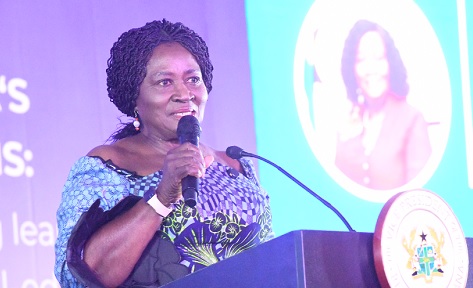The Vice President, Professor Naana Jane Opoku-Agyemang, has said the time has come for Africa to rely more on her resources to solve her problems.
She urged Africans to mobilise their collective efforts in innovation to raise sustainable African funding in their communities.
"We are being challenged by current circumstances to explore indigenous financing strategies that respond to national needs.
"We are blessed not only with rich and raw wealth, but also with intelligent, creative youth whose talents can drive Africa's transformation when we take better care of these natural resources and human resources," Prof Opoku-Agyemang told African education leaders.
She said this at the opening of the 2025 Triennale on Education and Training of the Association for the Development of Education in Africa (ADEA).
Forum
The event is one of Africa’s most influential forums for policy dialogue, attracting leaders and stakeholders to share best practices, innovations and evidence-based strategies for improving education across the continent.
![]()
Guests at the 2025 ADEA Conference in Accra. Pictures: SAMUEL TEI ADANO
It is being held on the theme: “Strengthening the resilience of Africa’s educational systems: Advancing towards ending learning poverty by 2035, with a well-educated and skilled workforce for the continent and beyond.”
The three-day conference has brought together over 350 participants, including more than 30 African ministers of education and high-level representatives from international development partners such as the World Bank, the African Development Bank, UNESCO, the Gates Foundation, the Mastercard Foundation and the Global Partnership for Education (GPE).
Learning poverty
Prof Opoku-Agyemang noted that African governments continued to grapple with learning poverty.
"New problems like basic literacy skills, despite improvements in school enrolment, although improvements, are not necessarily matched outcomes.
"Learning poverty undermines our development goals," the Vice President told the Africa education leaders.
She challenged Africans to repair their education system and cope with the rapid technological change in the light of transformation.
"We need to go beyond coping. We must also create, we must contribute to that technology.
"We need the skills that make them possible. We must also recognise our achievements. They have remained, even under the trying circumstances," she added.
Challenges
In a welcome statement, the Minister of Education, Haruna Iddrisu, expressed concern that Africa was still grappling with congested classrooms, shortage of teachers, lack of infrastructure to support and speed up digital inclusive and equitable quality education.
He questioned the commitment of African governments to invest more in education and to look for resources within their countries.
"It is even more compelling if you imagine the world of academia.
We all are witnesses to the compelling factor of dwindling commitment and investment by donors in the Middle East and in Africa.
"Therefore, we cannot continue to rely on donor support to finance our education. We are compelled to look within," Mr Iddrisu stressed.
Asset, call for action
The African Union Commissioner for Education, Science, Technology and Innovation, Prof Gaspard Banyankimbona, reminded the participants that education was Africa's most strategic investment, which was the foundation of prosperity and peace.
"If we educate our children well, our place in the world will no longer be negotiated by hand, but through the excellence of our human capital," he said.
The Executive Secretary of ADEA, Albert Nsengiyumva, expressed shock at the number of out-of-school children on the continent, adding, "we are talking about 100 million.
"So, leaders in the room, colleagues, this is a serious call for action.We cannot talk about learning outcomes in children not in school," he stated.

